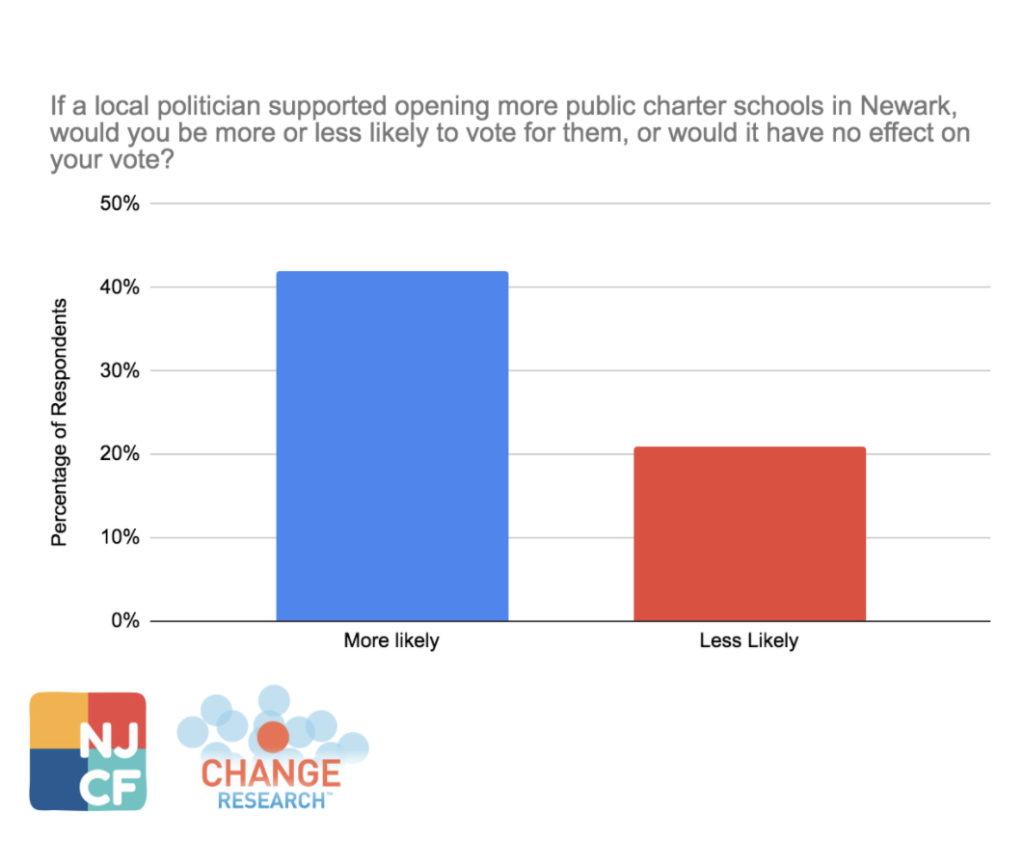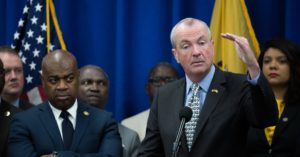This morning Change Research and the New Jersey Children’s Foundation released a poll that shows Newark’s public charter schools are broadly popular among all city voters. In fact, 66% of voters view the schools favorably and just 29% view them unfavorably. Complete results are available in the report, “Newarkers’ Views On Public Charter Schools and Other Key Education Issues.”
According to the poll, voters would be more likely to vote for a candidate who supports expanding public charter schools by a 2-to-1 margin. Such a candidate would have an advantage with voters of all political affiliations, and with every racial and ethnic group, age group, and gender.

The poll also found that, by a 57% to 25% margin, voters believe that public charter schools help improve public education. By a similar 59-23 margin, voters agree that public charter schools are an important part of the public school landscape in Newark. That includes 69% of parents of school-age children, 53% of traditional public school parents, and 92% of public charter school parents.

“For years, Newark has been a counterpoint to the national narrative that tries to divide public school parents and make access to quality schools a divisive issue,” said Kyle Rosenkrans, Executive Director of the New Jersey Children’s Foundation. “This poll shows that Newarkers support more quality public schools, regardless of school type, and want to see their elected officials continue to do the same.”
Here’s Jasmine Morrison, a parent advocate from Newark:
This poll proves what I’ve heard from Newark parents for years. Most parents I speak with have their children in charter schools or are waiting to get their children off of a waiting list. Newark parents want to choose the best public education for their kids, and want elected officials to support their right to make that choice.

“We are not at all surprised by the results of this poll, as we have seen through our long association with University Height Charter School the great demand Newarkers have for public charter schools, said Senior Pastor Rev. Timothy L. Adkins-Jones of the Bethany Baptist Church. “We believe that when non-profit public charter schools reflect the communities they serve, our children are provided greater opportunity and equity. We hope that this information will help ensure that our city continues to value the important voices of our parents and continues to collaborate for solutions. We’re confident that this is possible because of the leadership of our Mayor Ras Baraka, and the way that our city has changed its narrative when it comes to education, uniting together and embracing public education systems that work.”
Additional key findings from the poll include:
- A plurality of Newark voters, 42%, think public education in the city is on the right track. 24% of Newarkers say it’s on the wrong track – among virtually every demographic group, a plurality says schools are headed in the right direction.
- More than twice as many voters say there are more high quality schools available to Newark students than there were 10 years ago than say that there were fewer: 44% say more, 19% fewer, 18% about the same.

- Voters’ top complaint is that schools are underfunded. When asked to select the two top problems facing Newark schools, 46% say lack of funding. 28% chose “Poor performance,” while 26% chose “School safety.” Facilities, teachers, not enough great schools, and racial segregation were chosen by 17% or fewer. Notably, white voters were much less likely to cite lack of funding: only 30% of white respondents put it in their top two, while 48% of voters of color did.

This poll is part of a long-running effort by the Newark-based non-profit whose mission it is to promote a fact-based discussion about public education. It is the third such poll the Foundation has commissioned since its founding in 2018. The first was in 2018 and found broad support for Mayor Baraka and charter schools. The second poll was in 2019 and found similar support for the city’s educational improvement strategies.
The survey was conducted online from September 23-29th, and surveyed 516 registered voters in Newark. Post-stratification was done on age, gender, race, education, and 2016 presidential vote.





3 Comments